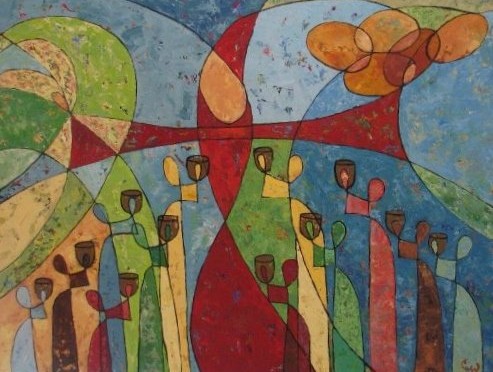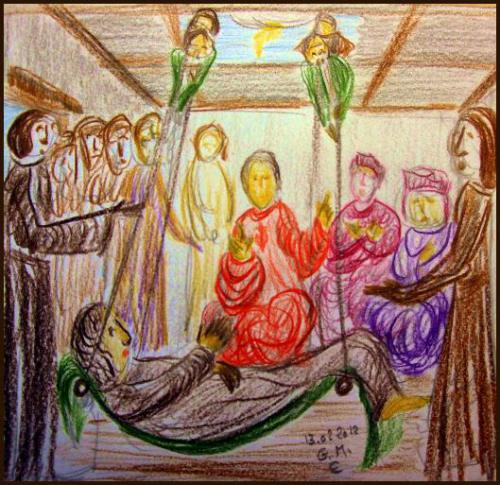Pastor Caitlin Trussell with Augustana Lutheran Church, Thanksgiving Eve, November 25, 2015
[sermon begins after Bible story]
Luke 17:11-19 On the way to Jerusalem Jesus was going through the region between Samaria and Galilee. 12 As he entered a village, ten lepers approached him. Keeping their distance, 13 they called out, saying, “Jesus, Master, have mercy on us!” 14 When he saw them, he said to them, “Go and show yourselves to the priests.” And as they went, they were made clean. 15 Then one of them, when he saw that he was healed, turned back, praising God with a loud voice. 16 He prostrated himself at Jesus’ feet and thanked him. And he was a Samaritan. 17 Then Jesus asked, “Were not ten made clean? But the other nine, where are they? 18 Was none of them found to return and give praise to God except this foreigner?” 19 Then he said to him, “Get up and go on your way; your faith has made you well.”
[sermon begins]
Almost exactly 15 years ago, I was serving as Council Vice President of my family’s congregation. Pastor-land was not yet on the horizon. It was a leadership design such that when elected by the congregation to Vice President, it was also an election to be President the following year. My year spent as Council Vice President was partly a year during which I watched the current President closely, basically picking up the nuts and bolts of what was expected by way of responsibilities. It was a fun and challenging year getting to know this way of serving the church.
During one Council meeting, discussion became heated. This can happen at Council meetings. After all, people who love Jesus and who love their church tend to bring some passion to the task. And as General George Patton said, “If everybody is thinking alike, then somebody isn’t thinking.”[1] Our Council President let the conversation and disagreement follow its course for a bit and then did this thing with her hands. Two of her fingers were raised up like closed peace sign. Making a half-circle with her hands in the air she closed her fingers and thumb together and said, “Let’s press pause.” Essentially pressing invisible buttons in mid-air. And that pause, along her summary of the key points, gave people some time to reflect and regroup. Probably gave some time for the gray matter to kick in so that thinking could happen after reacting.
“Let’s press pause.” A great line and a good move. Giving people time. Time to see. Time to think. Time to respond well.
The tenth leper in the Bible story could be having a similar “press pause” moment. He is hanging out with his fellow lepers – likely long cut-off from their families and community. They know the rules. No contact between people with leprosy and people who are well. They are socially, religiously, and physically unclean.[2] The ten lepers yell out to Jesus from a distance, “Jesus, Master, have mercy on us!” Somehow they know about this Jesus as they roam in the borderland between Samaria and Galilee. They cry out to Jesus. “Have mercy on us!” There is the first pause. The pause for lament, to cry out for mercy.
We “press pause” for communal lament in worship on Sundays during the Kyrie when we sing together, “Lord have mercy, Christ have mercy, Lord have mercy.” That lament we do together, singing to the Lord all of our individual laments poured into one voice made up of many. “Christ have mercy.”
Because of the lament of the lepers in the borderland, this is a timely passage for our reflection this evening. Many of us bring into this sanctuary questions about borders, who crosses them and who doesn’t. Some of us bring the fear of the villagers in the story who need the lepers to stay contained. Except in our 21st century moment, the undesirables are not as easy to spot and contain. So there is fear. There is heated conversation. There is a love of country, love of world, and love of life. And right now, there is time to “press pause,” bringing a lament to Christ. “Have mercy on us!”
In the Bible story, the lepers’ lament “presses pause” on whatever Jesus was heading to do. Giving Jesus time to see. Time to think. Jesus sees the lepers, talks to them, heals them on their way to the priests, restoring them to family and community. All ten of them receive this healing from Jesus through no merit of their own. They didn’t earn it, not one of them proving themselves worthy of help first.
One of the now healed men “presses pause” on the way to the priests. The healed man sees what just happened, the healing that’s taken place. He pauses to use his gray matter to think. Before following Jesus’ direction to continue on to the priests, he turns around to go thank Jesus. The healed man thanks Jesus first by flinging himself down at Jesus’ feet. That is no less than enthusiastic gratitude! Jesus points out that it is the “foreigner” of the ten who returns to give praise and thanks. The tenth man, however, presses pause, giving praise to God and gratitude to Jesus. We could describe what the tenth man does in a single word – worship.
We follow this healed man’s example in our Sunday worship. After we sing the Kyrie together, giving voice to our lament, very often we sing a song of praise and thanksgiving. Pressing pause, and giving thanks and praise to God at the beginning of our worship just as the healed man does.
Of the other nine men, Jesus asks, “Where are they?” Note for a moment that the other nine do nothing wrong.[3] They do exactly what Jesus asks them to do and they retain their healing. To the healed man lying on the ground in front of him, Jesus says, “Get up, go on your way, your faith has made you well.” The word translated as “well” is translated from the word “sodzo” in the Greek. Sodzo is translated across the New Testament in multiple ways. In the verses today it reads “well.” In other places it reads healed, made whole, or saved.[4] All ten lepers are healed. One returns to Jesus after pressing pause, thinking. He is not just healed but “is made whole, restored, drawn back into relationship with God and humanity” – in a word, saved.[5]
We talked in Adult Sunday School these past few weeks about the Gospel of Luke. Salvation is a big theme in this gospel. Salvation being communal, concrete, and cosmic. Jesus followers hear his word and act on it. Tangible acts of healing, feeding, inclusivity, restoration, liberation, and prophetic action taking place in community with each other.[6] We also talked about whether or not we could see our need for Jesus. Salvation and need go hand-in-hand. The lepers saw their need clearly. They wore it on their skin. We’re better at hiding our need, or at least not acknowledging it with other people or maybe even to ourselves. Yet here we are together. In need. Bringing lament. Bringing gratitude. Lament and gratitude simultaneously.
Many of us don’t have the luxury of the linear progression from lament to gratitude that the lepers do. We carry both lament and gratitude at the same time. A lament for a relationship gone awry. A lament for a health issue of our own or someone we love. A lament for our own fear in a world of uncertainty. A lament for so many people around the world and in our own neighborhoods who cry out for help.
Woven through our lament here together, gratitude pours out in praise to God and thanksgiving to Jesus. Gratitude for our life and breath. Gratitude for family and friends Gratitude for work and pay if we are employed or retired well. Gratitude for our congregation through whom we hear God’s good Word to challenge us and to comfort us as well the community of the body of Christ to connect us. Gratitude for God in whom we live and move and have our very being.
By grace, salvation is given to us in Christ Jesus. Like the lepers, it is without merit – pure gift. “For by grace you have been saved through faith, and this is not your own doing; it is the gift of God.”[7] Praise God and thank you Jesus! Amen.
[1] George Patton, US Army Commanding General, World War II (1941-1945). http://www.generalpatton.com/quotes/
[2] David Lose, President of Lutheran Theological Seminary at Philadelphia, for Working Preacher, Commentary on Luke 17:11-19 on October 10, 2010. https://www.workingpreacher.org/preaching.aspx?commentary_id=783
[3] David Lose, “Dear Working Preacher…” October 7, 2013. http://www.workingpreacher.org/craft.aspx?post=2796
[4] Lose, October 10, 2010. https://www.workingpreacher.org/preaching.aspx?commentary_id=783
[5] Ibid.
[6] Raymond Pickett, Professor of New Testament, Lutheran School of Theology at Chicago. The Year of Luke in Sundays and Seasons 2016. (Minneapolis: Augsburg Fortress, 2015), 12-14.
[7] Ephesians 2:8-9









![It’s Going to the Birds [In a Markan, Hitchcockian Kind of Way] – Mark 4:26-34, 2 Corinthians 5:6-7, 14-20](https://caitlintrussell.org/wp-content/uploads/2015/06/Mustard-Seed-and-Bird.sermon-Caitlin-Trussell.jpg)
